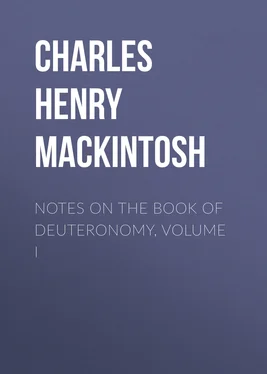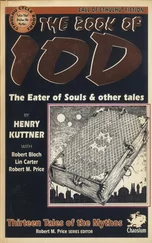Charles Henry Mackintosh - Notes on the Book of Deuteronomy, Volume I
Здесь есть возможность читать онлайн «Charles Henry Mackintosh - Notes on the Book of Deuteronomy, Volume I» — ознакомительный отрывок электронной книги совершенно бесплатно, а после прочтения отрывка купить полную версию. В некоторых случаях можно слушать аудио, скачать через торрент в формате fb2 и присутствует краткое содержание. Жанр: foreign_prose, foreign_antique, на английском языке. Описание произведения, (предисловие) а так же отзывы посетителей доступны на портале библиотеки ЛибКат.
- Название:Notes on the Book of Deuteronomy, Volume I
- Автор:
- Жанр:
- Год:неизвестен
- ISBN:нет данных
- Рейтинг книги:4 / 5. Голосов: 1
-
Избранное:Добавить в избранное
- Отзывы:
-
Ваша оценка:
- 80
- 1
- 2
- 3
- 4
- 5
Notes on the Book of Deuteronomy, Volume I: краткое содержание, описание и аннотация
Предлагаем к чтению аннотацию, описание, краткое содержание или предисловие (зависит от того, что написал сам автор книги «Notes on the Book of Deuteronomy, Volume I»). Если вы не нашли необходимую информацию о книге — напишите в комментариях, мы постараемся отыскать её.
Notes on the Book of Deuteronomy, Volume I — читать онлайн ознакомительный отрывок
Ниже представлен текст книги, разбитый по страницам. Система сохранения места последней прочитанной страницы, позволяет с удобством читать онлайн бесплатно книгу «Notes on the Book of Deuteronomy, Volume I», без необходимости каждый раз заново искать на чём Вы остановились. Поставьте закладку, и сможете в любой момент перейти на страницу, на которой закончили чтение.
Интервал:
Закладка:
But on the other hand, what can be more lovely or more refreshing than the figures used to set forth the deep blessedness of simple trust in the Lord?—"A tree planted by the waters," "spreading out her roots by the rivers," the leaf ever green, the fruit never ceasing. Perfectly beautiful! Thus it is with the man who trusteth in the Lord, and whose hope the Lord is. He is nourished by those eternal springs that flow from the heart of God. He drinks at the Fountain, life-giving and free. He finds all his resources in the living God. There may be "heat," but he does not see it; "the year of drought" may come, but he is not careful. Ten thousand creature-streams may dry up, but he does not perceive it, because he is not dependent upon them; he abides hard by the ever-gushing Fountain. He can never want any good thing. He lives by faith.
And here, while speaking of the life of faith—that most blessed life, let us clearly understand what it is, and carefully see that we are living it. We sometimes hear this life spoken of in a way by no means intelligent. It is not unfrequently applied to the mere matter of trusting God for food and raiment. Certain persons who happen to have no visible source of temporal supplies—no settled income—no property of any kind, are singled out and spoken of as "living by faith," as if that marvelous and glorious life had no higher sphere or wider range than temporal things—the mere supply of our bodily wants.
Now, we cannot too strongly protest against this most unworthy view of the life of faith. It limits its sphere and lowers its range in a manner perfectly intolerable to any one who understands aught of its most holy and precious mysteries. Can we for a moment admit that a Christian who happens to have a settled income of any kind is to be deprived of the privilege of living by faith? Or, further, can we permit that life to be limited and lowered to the mere matter of trusting God for the supply of our bodily wants? Does it soar no higher than food and raiment? Does it give no more elevated thought of God than that He will not let us starve or go naked?
Far away, and away forever, be the unworthy thought! The life of faith must not be so treated. We cannot allow such a gross dishonor to be offered to it, or such a grievous wrong done to those who are called to live it. What, we would ask, is the meaning of those few but weighty words, "The just shall live by faith"? They occur, first of all, in Habakkuk ii. They are quoted by the apostle in Romans i, where he is, with a master-hand, laying the solid foundations of Christianity. He quotes them again in Galatians iii, where he is, with intense anxiety, recalling those bewitched assemblies to those solid foundations which they, in their folly, were abandoning. Finally, he quotes them again in chapter x. of his epistle to the Hebrews, where he is warning his brethren against the danger of casting away their confidence and giving up the race.
From all this we may assuredly gather the immense importance and practical value of the brief but far-reaching sentence, "The just shall live by faith." But to whom does it apply? Is it only for a few of the Lord's servants, here and there, who happen to have no settled income? We utterly reject the thought. It applies to every one of the Lord's people. It is the high and happy privilege of all who come under the title—that blessed title, "The just." We consider it a very grave error to limit it in any way. The moral effect of such limitation is most injurious. It gives undue prominence to one department of the life of faith which, if any distinction be allowable, we should judge to be the very lowest. But in reality, there should be no distinction: the life of faith is one. Faith is the grand principle of the divine life from first to last. By faith we are justified, and by faith we live; by faith we stand, and by faith we walk. From the starting-post to the goal of the Christian course it is all by faith.
Hence, therefore, it is a serious mistake to single out certain persons who trust the Lord for temporal supplies, and speak of them as living by faith, as if they alone did so. And not only so, but such persons are held up to the gaze of the Church of God as something wonderful; and the great mass of Christians are led to think that the privilege of living by faith lies entirely beyond their range. In short, they are led into a complete mistake as to the real character and sphere of the life of faith, and thus they suffer materially in the inner life.
Let the Christian reader, then, distinctly understand that it is his happy privilege, whoever he be or whatever be his position, to live a life of faith, in all the depth and fullness of that word. He may, according to his measure, take up the language of the blessed apostle, and say, "The life that I live in the flesh, I live by the faith of the Son of God, who loved me, and gave Himself for me." Let nothing rob him of this high and holy privilege which belongs to every member of the household of faith. Alas! we fail. Our faith is weak, when it ought to be strong, bold, and vigorous. Our God delights in a bold faith. If we study the gospels, we shall see that nothing so refreshed and delighted the heart of Christ as a fine bold faith—a faith that understood Him and drew largely upon Him. Look, for example, at the Syrophenician in Mark vii, and the centurion in Luke vii.
True, He could meet a weak faith—the very weakest. He could meet an "If Thou wilt " with a gracious "I will"—an "If Thou canst " with "If thou canst believe, all things are possible." The faintest look, the feeblest touch, was sure to meet with a gracious response; but the Saviour's heart was gratified and His spirit refreshed when He could say, "O woman, great is thy faith; be it unto thee even as thou wilt;" and again, "I have not found so great faith, no, not in Israel."
Let us remember this. We may rest assured it is the very same to-day as when our blessed Lord was here amongst men. He loves to be trusted, to be used, to be drawn upon. We can never go too far in counting on the love of His heart or the strength of His hand. There is nothing too small, nothing too great for Him; He has all power in heaven and on earth; He is head over all things to His Church; He holds the universe together; He upholds all things by the word of His power. Philosophers talk of the forces and laws of nature: the Christian thinks with delight of Christ, His hand, His Word, His mighty power. By Him all things were created, and by Him all things consist.
And then His love! What rest, what comfort, what joy, to know and remember that the almighty Creator and Upholder of the universe is the everlasting Lover of our souls! that He loves us perfectly; that His eye is ever upon us, His heart ever toward us; that He has charged Himself with all our wants, whatever these wants may be—whether physical, mental, or spiritual! There is not a single thing within the entire range of our necessities that is not treasured up for us in Christ. He is Heaven's treasury—God's storehouse, and all this for us.
Why, then, should we ever turn to another? Why should we ever, directly or indirectly, make known our wants to a poor fellow-mortal? Why not go straight to Jesus? Do we want sympathy? Who can sympathize with us like our most merciful High-Priest, who is touched with the feeling of our infirmities? Do we want help of any kind? Who can help us like our almighty Friend, the Possessor of unsearchable riches? Do we want counsel or guidance? Who can give it like the blessed One who is the very wisdom of God, and who is made of God unto us wisdom? Oh, let us not wound His loving heart, and dishonor His glorious name by turning away from Him. Let us jealously watch against the tendency so natural to us to cherish human hopes, creature-confidences, and earthly expectations. Let us abide hard by the Fountain, and we shall never have to complain of the streams. In a word, let us seek to live by faith, and thus glorify God in our day and generation.
Читать дальшеИнтервал:
Закладка:
Похожие книги на «Notes on the Book of Deuteronomy, Volume I»
Представляем Вашему вниманию похожие книги на «Notes on the Book of Deuteronomy, Volume I» списком для выбора. Мы отобрали схожую по названию и смыслу литературу в надежде предоставить читателям больше вариантов отыскать новые, интересные, ещё непрочитанные произведения.
Обсуждение, отзывы о книге «Notes on the Book of Deuteronomy, Volume I» и просто собственные мнения читателей. Оставьте ваши комментарии, напишите, что Вы думаете о произведении, его смысле или главных героях. Укажите что конкретно понравилось, а что нет, и почему Вы так считаете.












